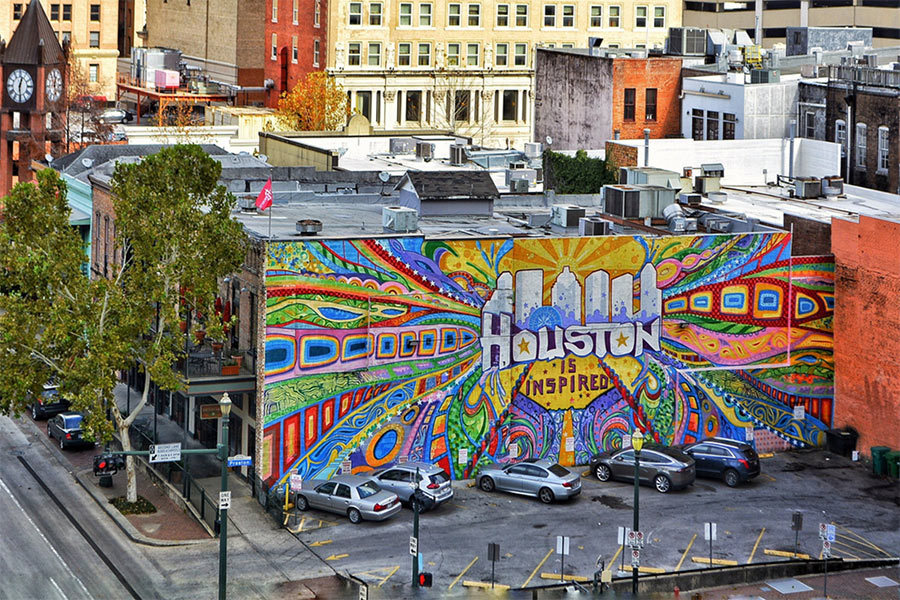
- Pearland’s Lonza Viral Therapy Biotech Building Trades Hands [Realty News Report]
- Clay Development To Buy Vacant Kennametal Industrial Building for New Development Dubbed Offices @ North Post Oak [Houston Chronicle]
- The Economic Growth Challenges Facing Houston’s Suburbs [Houston Chronicle ($)]
- Eight Elements of a Successful Innovation District [The Urban Edge]
- FEMA Praises Houston’s New Floodplain Regulations [Houston Chronicle]
- Raw Fish Restaurant Diced Poke Debuts at Mid Main Lofts [Eater Houston]
- Taiwanese Sweet Shop 85C Bakery Café Planning New Houston Location in Friendswood [Eater Houston]
- Hearsay Bar Opening in the James Fadden Building in Downtown Galveston [Galveston County Daily News ($)]
- David Adickes Piece ‘Art is Everywhere in Houston’ Installed Along I-10 Near Yale [Houston Chronicle]
- Slideshow: Scenes from the 31st Annual Houston Art Car Parade [Houston Chronicle]
Photo of Art Car Parade: Russell Hancock via Swamplot Flickr Pool
Headlines





Regarding the new floodplain regulations.. I am curious how this would play out in urban neighborhoods with small lots. For example in my neighborhood where the average sized lot hovers around 5,000 sq feet and all of us are in the 500 year floodplain. About 15 years ago when I lived in a 1940’s bungalow, the neighbor to the left and the right of me were both torn down and replaced with raised properties. All of a sudden I had a foot of water in the garage and backyard with every single rain. Perhaps this wouldn’t be an issue with pier and beam foundations but with raised property + slab foundation, new construction would burden neighboring properties.
Has anyone read the specifics of the new regulations to be able to say how new construction might mitigate the transferring of flood risk to neighboring properties? In Houston, every inch counts.
@ Nice Neighbor: My understanding is that it is illegal to divert runoff onto a neighbor’s property; it is supposed to be channeled to the street. So if this was street flooding that was causing your problems then yes, it is possible that the aggregate effect of raised lots in your neighborhood could have been the root cause. But if you flooded right away due to immediate effects of runoff, and that resulted in damages, then you (perhaps being enjoined by your insurer) should have been able to work through the legal system and recover some expenses and lost property value from the culpable parties.
.
RE: Innovation Districts. I am still confused by what these things are, how they work, what they are supposed to look like, and so on. One of the most successful examples that comes to my mind is Raleigh NC’s “Research Triangle”, but it is basically just a big suburban business park near the airport in a decent-sized metro area with a lot of reputable universities and a top-tier medical program. There’s practically no example that can be cited about such a district in an established area of NYC or SF that is going to have any applicability to other cities, and the best innovation district anywhere near SF is Silicon Valley, which also breaks all of the rules.
.
I will say this, however, that the TMC’s push to embrace new members outside of its traditional boundaries and also to provide collaborative opportunities for researchers…this is potentially very effective. Innovation is about bringing people together. Facilities are important, especially to hype the project and give it credibility in tangible terms to potential contributors or donors, but the human capital has got to be there and managed not too tightly and not too loosely and the venture capital is really the thing that has to be captured and enticed. VC has always been Houston’s biggest problem.
.
One other thing… None of this relates to Amazon’s decision at all. Houston was a very poor contender for a wide variety of reasons and anybody who thinks that we realistically had a shot at HQ2 was delusional.
Innovation districts- see this Brooking Institutions study:
https://www.brookings.edu/essay/rise-of-innovation-districts/
Innovation Districts = modern way to part fools and their money.
.
Show me three tangible examples of how an innovation district improved someone’s daily life and maybe I’ll eat my hat.
.
With the internet widely available to connect human knowledge to the far corners of our globe, what can be gained by having a building? If the idea is to collaborate, then use the internet. Cheaper and faster to incubate early ideas that way.
@ Gisgo: The article you linked to specifically dissed the “innovation districts” which have a demonstrated track record of being successful and then went on to list so many other cities in North America — while not others like Dallas and Austin that are doing perfectly well — that the list itself is a head-scratcher. What they hell does it mean? Why is it important? Are they just making this up as they go along? Nothing is really very clear, and the more that is said, the weaker is what is being said.
@Innovation R Us Generally I agree with your sentiment, but there is value in an “agglomeration economy” — getting an exchange of ideas from proximity of professionals. There’s a reason why all the car companies are in Detroit, or all music is in Nashville, or for that matter, energy is in Houston.
Well, in Texas if your business goes under the investors can take your house. Not so in California. So right away there’s a fundamental insurmountable difference. That said, @Innovation R Us is both right and wrong: wrong in the sense that there is an emergent value from having people in close proximity to each other, but also right in the sense that Houston as a city and as a paradigm consistently chooses to get things “off the shelf” and there’s no indication that this Innovation District will be any different.
.
Most likely it will consist of clusters of workspaces – leased out like shops in a shopping mall (with the exception of WeWork, which gets whole buildings) full of startups trying to bootstrap themselves – likely via internet marketing – because they are unwilling to potentially give up their homes should their startup attempt fall through. There will also be training spaces, possibly corporate-owned and probably operating along the lines of Adecco’s recent purchase of General Assembly with all that that entails.
.
All in all, as long as the bars keep being built in that general area, and there are places to meet up, it should be a satisfyingly idiomatic Houston implementation of an Innovation District.
@ Txcon: Thank you for agreeing with the general sentiment of the reply. But, I’d point out a slight flaw in your analogy of “all the car companies in Detroit”.
.
The car companies did it without an Innovation District being built by government. Nashville’s music scene did it without the City of Nashville building a “Music Innovation Building”. And, all of Houston’s energy sector did it on their own.
.
I guess my objection to this is really two-fold: (1) I’m dubious of the track record of such things to improve the average person’s daily life and (2) I object to city tax dollars going to such a speculative use. After all, the City has plenty of things it can buy such as pothole repair, roads, sewers, fire stations, and libraries rather than a moonshot on this building.
@fivefourthree, on what planet any investor or creditor can take your house in Texas? Texas is a homestead state nobody except the mortgage company and maybe the government can take your house, and even then it’s a huge fight. There’s a reason business owners dump millions into homestead property in Texas, your business can completely fail, just go through bankruptcy and sell your homestead afterwards and you’re liquid again.
@TxCon: With respect to “agglomeration economyâ€, perhaps it’s more Nash Equilibrium (e.g. having a gas station at every corner)?
Sounds mediocre. I’ll grab the popcorn, even though I’m pretty sure I’ve seen this one before.